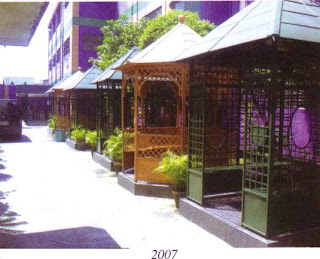
As with most good things, Metro Psychiatry Facility, Inc. was not what was originally intended to be.
The building that now houses the psychiatric hospital and rehabilitation institution was meant to be a school for children with learning disabilities, as founder and executive director Dr. Benita Sta. Ana Ponio tells it.
She said that she had two children with learning disabilities and she and her husband were finding it difficult to find the kind of help their children needed, so they decided help put up a special school.
However, the couple could not agree with the prospective teachers on vital issues. For instance, the teachers wanted a student-teacher ratio of 8:1, which the Ponio couple did not find acceptable. In addition, they wanted more offices to support their advocacy work.
“So we decided to call it off before we end up not being friendly,” Dr. Ponio said.
Already with a shell, Dr. Ponio said she and her husband argued over what to do with the idle building. She said her husband told her to set up a psychiatric hospital, while she told him to open n general hospital.

“Guess who won the argument,” she said with a smile.
After deciding to use the building for a psychiatric hospital, Dr. Ponio asked her brother in law, who was then an accountant with the well-known accounting firm SGV, to help her create a project proposal that will be presented to her colleagues.
“I wanted it to be a premier institution,” she said. Aside &am being a recognized facility, Dr. Ponio st she wanted her hospital to adhere to a certain standard of care not found in most such institutions in the country. She added that she did not want this hospital to be like other government institutions that lack basic necessities for want of resources.
However, her vision also included a facility that was not as expensive as the other larger hospital.
“I wanted this to be a place where patients are not just locked up, not just lying in their beds while they are waiting for their medications to take effect,” she stressed.
What started as what could be called a fluke tuned out to be a resounding success.
Although they w.ere not set to earn anything over the first three years, the hospital turned in n Php 25,000 profit in the first year, Dr. Ponio related with a laugh.
Aside from the bottom lee though, success could be measured by the growth of the facility and its sustained partnerships with pharmaceutical companies, all intended to continuously improve services for the patients.
“It has improved so much from the time it started in terms of the facility and number of patients and staff,” she observed.
From a 35 bed hospital in 1999, it now houses 130 beds. It also now has a bigger kitchen, a gym, a basketball court and a swimming pool.
In addition, the hospital opened another branch in Cebu in 2005, which attracted investors on its own.
“I said I dreamt for it to grow but I didn’t imagine it to grow this big. i already consider PF-Cebu a bonus,” Dr. Ponio noted.
Meanwhile, she said, the facility has optimized its relationships with – pharmaceutical companies. Every October, Dr. Ponio said their partner pharmaceutical companies commit a certain amount to support such programs as the hospital newsletter, the annual sportsfest, and the quarterly lay forum – all of which entail cost that is not passed on to the patients because of their assistance.
“I think one of the major reasons why this is working is because we are not as expensive as the big hospitals,” Br. Ponio said. “But more than – that, the passion and commitment we put in to om work makes a lot of difference.”
However, she noted that because doctors “don’t know money, there was a need to understand it better to make things run.”
Dr. Fareda Flores, managing director and one of the incorporators., turned out to be a gem in this area because of her natural knack for – business. She studied at the Asian Institute of Management (AIM) to “ enhance her financial management skills.
“She was the youngest but she turned out to be the workhorse of the group,” Dr. Poriio observed.
She added that “things moved fasts” after Br. Flores did her stint in business school because she knew where to allocate the money that was coming in. Dr. Ponio credits Dr. Flores with coming up with the continuing partnership program with pharmaceutical companies.
“We can’t do anything good if we don’t have the money to do it with,” she observed.
Although she does not want to make any more plans for the moment for MPF Pasig, Dr. Ponio said she hopes the facility will become a training institution not only for doctors, but also for allied professions as well.
“I always wanted it to be a training institution,” she added. Dr. Ponio attributes this dream to her stint as a training officer at the National Center for Mental Health earlier in her career.
Already, the hospital accepts nursing affiliates from various schools across the country.
In addition, the Philippine Board of Psychiatry conducts its oral exams in the hospital.
“The doctors who take their exams here are surprised to find that patients here are very well educated about their condition,” Dr. Ponio related.
Meanwhile, she said she and her team plan to focus on improving the facilities of MPF-Cebu, while she believes the Pasig institution is already complete.
Also on the horizon is the setting up of another MPF .in Mindanao.
“There’s always that thought that there will be another Metropsych in the country. It will happen,” she added.







